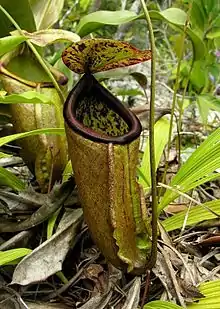Nepenthes treubiana
Nepenthes treubiana (/nɪˈpɛnθiːz trɔɪbiˈɑːnə/; after Melchior Treub) is a tropical pitcher plant native to Western New Guinea and the island of Misool (including a number of smaller islands).[1][2][3]
| Nepenthes treubiana | |
|---|---|
 | |
| A lower pitcher of N. treubiana from the McCluer Gulf, New Guinea | |
| Scientific classification | |
| Kingdom: | Plantae |
| Clade: | Tracheophytes |
| Clade: | Angiosperms |
| Clade: | Eudicots |
| Order: | Caryophyllales |
| Family: | Nepenthaceae |
| Genus: | Nepenthes |
| Species: | N. treubiana |
| Binomial name | |
| Nepenthes treubiana Warb. (1891) | |
| Synonyms | |
| |
This species occurs on the cliffs of the McCluer Gulf and in coastal regions of the Fakfak peninsula.[2] Large subpopulations are now confirmed on Misool.[1][4] Geographer Stewart McPherson had been unable to find any plants during a prior trip to the island (although he did find N. sp. Misool).[2]
Nepenthes treubiana has no known natural hybrids.[2] No forms or varieties have been described.[2]
References
- Clarke, C.M. (2014). "Nepenthes treubiana". IUCN Red List of Threatened Species. 2014: e.T39707A21845586. doi:10.2305/IUCN.UK.2014-1.RLTS.T39707A21845586.en.
- McPherson, S.R. 2009. Pitcher Plants of the Old World. 2 volumes. Redfern Natural History Productions, Poole.
- McPherson, S.R. & A. Robinson 2012. Field Guide to the Pitcher Plants of Australia and New Guinea. Redfern Natural History Productions, Poole.
- Jebb, M.H.P. 1991. An account of Nepenthes in New Guinea. Science in New Guinea 17(1): 7–54.
Further reading
- Bauer, U., C.J. Clemente, T. Renner & W. Federle 2012. Form follows function: morphological diversification and alternative trapping strategies in carnivorous Nepenthes pitcher plants. Journal of Evolutionary Biology 25(1): 90–102. doi:10.1111/j.1420-9101.2011.02406.x
- Clarke, C.M. 2006. Introduction. In: Danser, B.H. The Nepenthaceae of the Netherlands Indies. Natural History Publications (Borneo), Kota Kinabalu. pp. 1–15.
- Macfarlane, J.M. 1911. New species of Nepenthes. Contributions from the Botanical Laboratory of the University of Pennsylvania 3(3): 207–210. (plates I–II)
- (in Indonesian) Mansur, M. 2001. "Koleksi Nepenthes di Herbarium Bogoriense: prospeknya sebagai tanaman hias" (PDF). Archived from the original (PDF) on 2012-03-19. In: Prosiding Seminar Hari Cinta Puspa dan Satwa Nasional. Lembaga Ilmu Pengetahuan Indonesia, Bogor. pp. 244–253.
- (in German) Marwinski, D. 2014. Eine Expedition nach West-Papua oder auf den Spuren von Nepenthes paniculata. Das Taublatt 78: 11–44.
- Meimberg, H., A. Wistuba, P. Dittrich & G. Heubl 2001. Molecular phylogeny of Nepenthaceae based on cladistic analysis of plastid trnK intron sequence data. Plant Biology 3(2): 164–175. doi:10.1055/s-2001-12897
- (in German) Meimberg, H. 2002. "Molekular-systematische Untersuchungen an den Familien Nepenthaceae und Ancistrocladaceae sowie verwandter Taxa aus der Unterklasse Caryophyllidae s. l." (PDF). Ph.D. thesis, Ludwig Maximilian University of Munich, Munich.
- Meimberg, H. & G. Heubl 2006. Introduction of a nuclear marker for phylogenetic analysis of Nepenthaceae. Plant Biology 8(6): 831–840. doi:10.1055/s-2006-924676
- Mey, F.S. 2014. A short visit to Papua, video by Alastair Robinson and Davide Baj. Strange Fruits: A Garden's Chronicle, February 25, 2014.
External links
This article is issued from Wikipedia. The text is licensed under Creative Commons - Attribution - Sharealike. Additional terms may apply for the media files.
